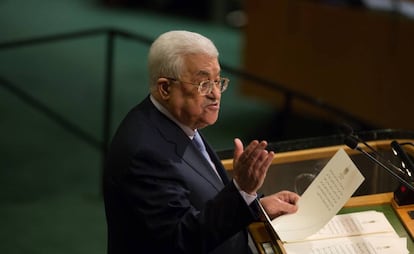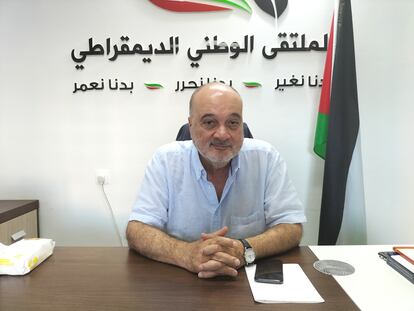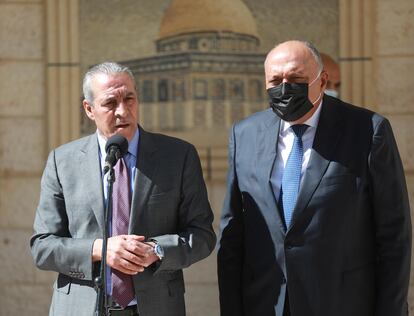Palestine’s Mahmoud Abbas struggles to appoint his successor
Increasingly isolated and autocratic, the West Bank leader is clinging to power despite 74% of the population calling for his resignation

As Palestinian President Mahmoud Abbas touched down in Qatar on November 19, social networks were abuzz over leaked papers from the Palestinian Embassy in Doha, revealing that some 20 family members and advisors had accompanied him to the opening ceremony of the World Cup, with VIP tickets and almost $80,000 in hotel bills. Although the veracity of the documents has not yet been confirmed, the response back home exposes the profound unpopularity of an increasingly authoritarian leader, isolated and questioned both on the streets and within political circles, with a mandate to rule that has long expired since he was voted in as president following Palestinian leader Yasser Arafat’s demise 17 years ago.
According to the latest poll by the Palestinian Center for Policy and Survey Research, released last month, 74% of respondents want him to resign and 57% believe that the Palestinian Authority, which he heads, has become a liability. Meanwhile, the leaked papers expose the internal struggle to succeed him. The focus is no longer on replacing a leader who is 87, chain smokes and suffers from heart problems, but on what will happen the day after his death.
Nasser Al-Qudwa, who was briefly foreign minister in 2005, still defines himself as a member of the Fatah party – the party founded by his uncle, Yasser Arafat, now led by Abbas – and which he has been a part of since 1969. However, when he decided to return definitively to Palestine from the United States last September, he did not settle, as might have been expected, in the West Bank, but in Gaza, the isolated and impoverished strip of Palestinian territory where he was born in 1954 and which is governed by the rival Hamas movement. “I started to feel that you can’t trust the situation in Ramallah [in the West Bank], because you can’t trust the man [...] who is capable of anything,” he explains in a modest office in Gaza capital.

With decades of international experience in high-level posts behind him, from Palestinian representative to the UN to special envoy to Syria, Al-Qudwa avoids using Abbas’ name. He maintains that he feared for his life in the West Bank, that the Fatah party has been “hijacked by a group” and that either “the person is changed or that person miraculously changes his policies.”
In 2021, Al-Qudwa ran in the legislative elections, representing a Fatah splinter group. Aware he lacked clout, he allied himself to Palestine’s greatest living icon, Marwan Barghouti, who is serving five life sentences in Israel for organizing bombings during the Second Intifada, the Palestinian uprising that kicked off in 2000. The elections were never held, but Al-Qudwa was punished for his dissidence with expulsion from the Fatah Central Committee, withdrawal of his diplomatic passport and dismissal from the leadership of the technically independent Yasser Arafat Foundation.
“Institutions have been destroyed, the rule of law has disappeared, there are no human rights and the dignity of the average Palestinian has been violated to the point where we get the death of Nizar Banat,” Al-Qudwa points out. The 2021 death of Banat, a well-known activist critical of Abbas, marked a turning point in the public perception of the president. Banat died after being beaten by the Palestinian security forces while under arrest. Protests in Ramallah over his death were harshly suppressed.
“This is the worst legitimacy crisis in the history of the Palestinian Authority,” Tahani Mustafa, Palestinian analyst at the International Crisis Group think tank, tells EL PAÍS. “Abbas has dismantled the system around him that could confer legitimacy.” Mustafa also criticizes the international community for turning a blind eye. With a mandate that expired in 2009 and parliament dissolved, Abbas has been ruling by decree. He has signed 350 presidential orders. The last, in October, was the creation of a Supreme Council to supervise the judicial system, with himself appointed as head.
Abbas has the unwavering support of the West for his commitment to dialogue and his moderate approach to resolving the Middle East conflict. For many Palestinians, however, he is the man who never takes a stand at the negotiating table. In fact, he did do so recently, on November 11, when he succeeded in getting the UN to ask the International Court of Justice to give its opinion on the legal status of the occupation of Palestine, thereby angering Israel. But his lack of local support is such that the news was tarnished two days later by his declarations on Benjamin Netanyahu’s electoral victory in Israel, saying he is “not a man who believes in peace” but that he would be forced “to deal with him.” Something similar happened with his speech at the UN General Assembly last September. His tone was bitter, but a parody of him calling on the international community to “Protect us!” circulated on Palestinian WhatsApp groups. The underlying message was that it was a blow to the deep-rooted Palestinian sense of dignity.
Circle of trust
Meanwhile, Abbas’ circle of trust is getting smaller and smaller. According to Mustafa, he barely consults with two people on decisions. Prominent figures such as Hanan Ashrawi, spokesperson for the Palestinian delegation at the Madrid Conference, and Yasser Abed Rabo, who was culture minister for 10 years under Arafat, have been marginalized and openly criticize Abbas’ drift. Even Tawfik Tirawi, until recently one of his closest collaborators, has fallen from grace over his chances of succession.
Many now link Tirawi to another leak, the one that, earlier this month, brought to light part of an investigation he headed into Arafat’s 2004 death in a French hospital, indicating that many in his entourage believe he was poisoned. One of the documents indicates that Arafat – a figure still respected across ideological divides – asked Abbas, then his prime minister and with whom he had a tense relationship, to convince Israel to end the siege on the Muqata. Abbas replied: “Whoever gets into trouble must know how to get out of it,” an apparent allusion to Arafat’s support for the Second Intifada.
The departure of historic leaders has gone hand in hand with the meteoric rise of Hussein al-Sheikh. Last February, Al-Sheikh joined the Executive Committee of the Palestine Liberation Organization, in a meeting boycotted by several factions and independent personalities and in which the live broadcast of Abbas’ inaugural speech was unexpectedly cancelled. Three months later, Al-Sheikh was promoted to secretary general and chief negotiator, positions previously held by veteran Saeb Erekat until his death from Covid-19 in 2020. Considered Abbas’s potential heir, he is at every one of the president’s diplomatic meetings, and last October traveled to Washington to meet with members of the US government.

Al-Sheikh, 61, epitomizes what a majority of Palestinians loathe as much as they need: coordination with Israeli military authorities, sealed in the 1993 Oslo Accord of which Abbas was a principle architect. Since 2007, Al-Sheikh has headed the General Authority of Civil Affairs, which coordinates with Israel on work permits, transporting the sick and the census in the occupied territories. He is the kind of successor to Abbas that would please Israel and the US, but whom only 3% of Palestinians want, according to a poll last June – this, despite coming from a refugee family and having spent 11 years in prison in Israel. Several analysts predict, in fact, a violent revolt if he is crowned the day Abbas finally makes his exit.
Sign up for our weekly newsletter to get more English-language news coverage from EL PAÍS USA Edition.
Tu suscripción se está usando en otro dispositivo
¿Quieres añadir otro usuario a tu suscripción?
Si continúas leyendo en este dispositivo, no se podrá leer en el otro.
FlechaTu suscripción se está usando en otro dispositivo y solo puedes acceder a EL PAÍS desde un dispositivo a la vez.
Si quieres compartir tu cuenta, cambia tu suscripción a la modalidad Premium, así podrás añadir otro usuario. Cada uno accederá con su propia cuenta de email, lo que os permitirá personalizar vuestra experiencia en EL PAÍS.
¿Tienes una suscripción de empresa? Accede aquí para contratar más cuentas.
En el caso de no saber quién está usando tu cuenta, te recomendamos cambiar tu contraseña aquí.
Si decides continuar compartiendo tu cuenta, este mensaje se mostrará en tu dispositivo y en el de la otra persona que está usando tu cuenta de forma indefinida, afectando a tu experiencia de lectura. Puedes consultar aquí los términos y condiciones de la suscripción digital.









































